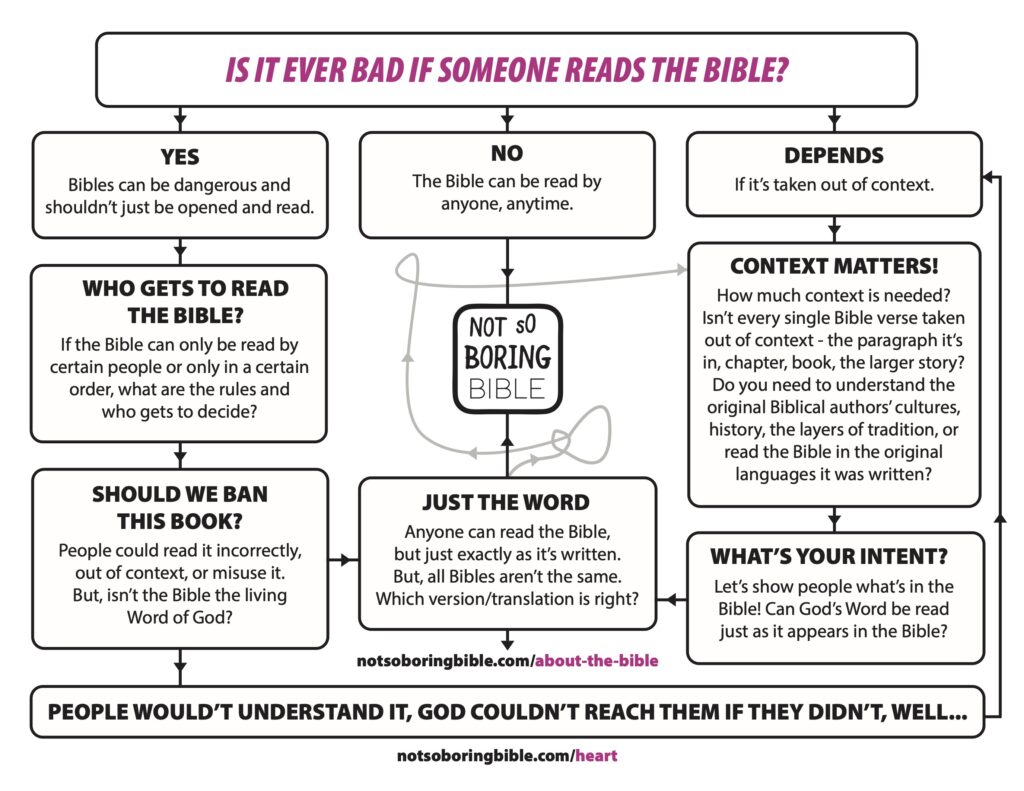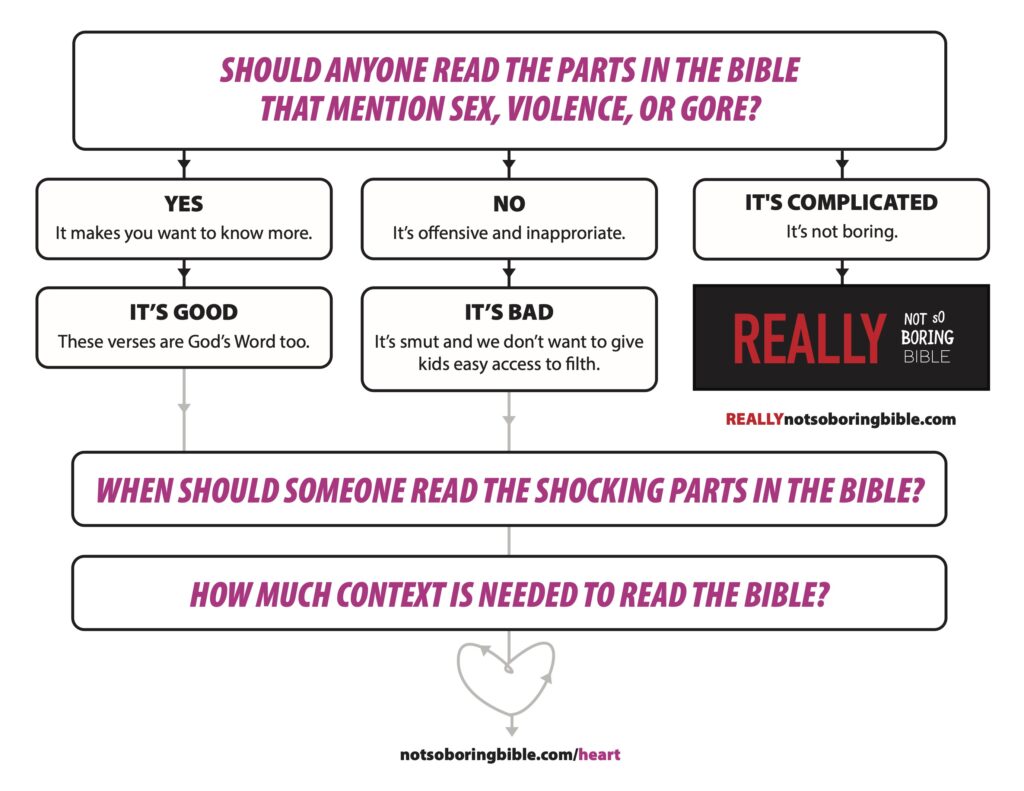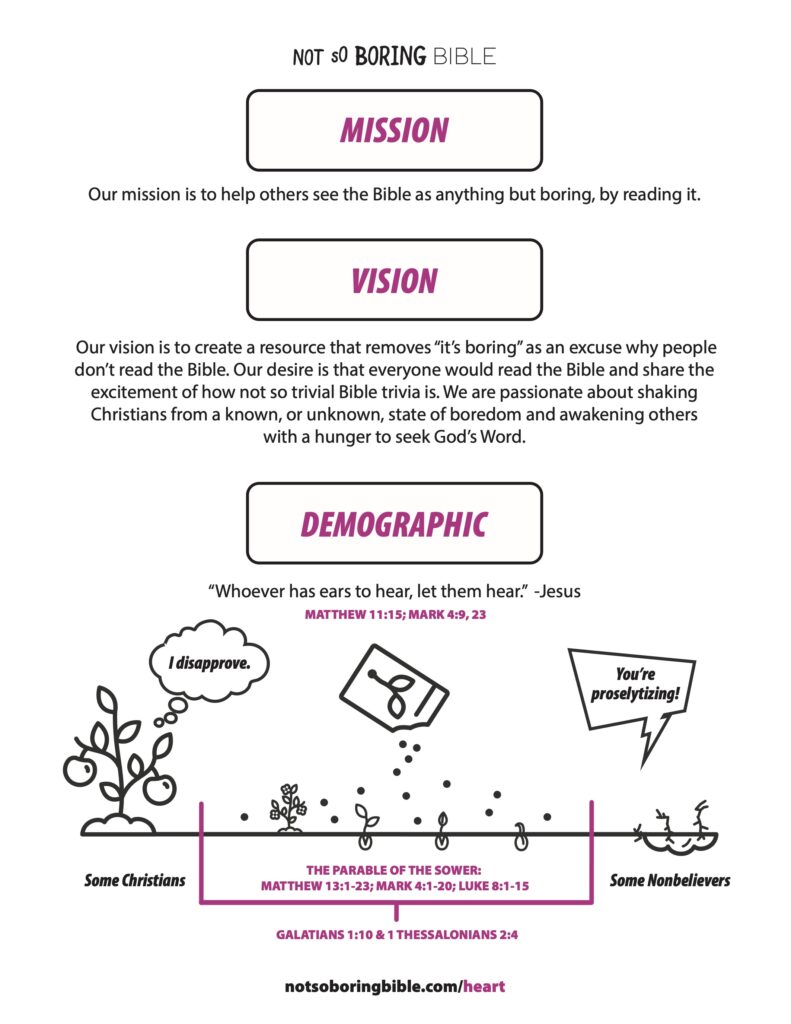Heart

Not So Boring Bible’s mission is to help others see the Bible as anything but boring, by reading it. But, why make something like this to begin with? Our heart behind making this resource is a hope that others will see and experience just how amazing the Bible is. Like the wind, we don’t know how the Spirit will move, but we trust His Word won’t return void. In building this site, we wrestled with two main questions:
1. Is it ever bad if someone reads the Bible?
2. Should anyone read the parts in the Bible that mention sex, violence, or gore?
These aren’t easy questions to answer. At our core, we’re just Bible trivia with a bunch of the strange, odd, and shocking verses. Not So Boring Bible is a way to spark interest and curiosity about this text. While we want to reach as many people as possible, we aren’t trying to please people. We are ok with the fact that this isn’t going to be a resource everyone likes or uses. No problem, plenty of other amazing Christian resources. But, we hope you see our heart in this work.
Our name, Not So Boring Bible, is a nudge at anyone whose impression or assumption is that the Bible is boring (We don’t think the Bible is boring). We love the Bible and our heart is to lead others into that excitement as well. We hope churches and nonbelievers find this resource helpful, if nothing else, just as a conversation starter. And for those people we do reach, we hope you look inside the Bible, grow in your knowledge and understanding of God, and we are thrilled to play any small part in that journey. But, if you don’t agree with how we are sowing seeds, we pray you are led to sow, or water, or grow seeds as well and that the Lord sends out more workers into the field to harvest – all for His glory.
Still here? Oh, great. You are, or are on your way to becoming, a Bible nerd! Congratulations! About those other two questions. Our heart for people to encounter, read and experience the Bible comes at the cost of how someone might see or read the Bible on our site. It’s just the Bible, pulled verses, and admittedly, not an ideal beginner’s Bible reading plan. When dealing with and reading the Word there are two more difficult questions to wrestle with:
3. When should someone read the shocking parts in the Bible?
Umm, never. LOL. Are these parts of the Bible we shouldn’t read much? We call these parts REALLY Not So Boring Bible. The Bible is God’s Word, so God clearly had something to say to us in these stories. We’re pretty sure God doesn’t need us to defend him. The problem is, there is definitely an age when it is appropriate to bring up such flagrant details and difficult subjects. But, what is that age? When did Jesus read this stuff? What age was he allowed to read Song of Songs? After someone knows about these shocking stories, reads them maybe once or twice, is it ok to memorize these verses, hold on to them, and reread them? Or can we not talk about these parts? These verses certainly aren’t making it into any Verse of the Day emails.
Here’s the Sunday School problem. The church wants to teach kids about the Bible. So, children learn about Noah’s ark, David and Goliath, and Daniel in the lions’ den. Classic felt board fun, am I right? These are stories in every children’s Bible. The parts these Bibles leave out are all the dead bodies of the victims of the flood after the waters recede (Noah getting drunk after and whatever Ham did to him!), David standing over Goliath and cutting off the fallen giant’s head, and the king throwing all the men who accused Daniel of the crime into the lions’ den themselves (also with their entire families) – all eaten alive by hungry lions. If we hide details like this are we honoring the story, watering them down for everyone’s good, or ignoring a key component of their conclusion? (Did anyone read chapter 4 of Jonah?)
4. How much context is needed to read the Bible?
None, right? God can do His thing without needing to give a big backstory. But, the issue isn’t God, it’s our modern Bibles (well, modern being since the mid 16th century). The original books in the Bible didn’t have chapters and verses numbered. Think about it – every single Bible verse is taken out of context if you just quote the verse. The verses are part of a paragraph, chapter, book, and it matters who’s speaking or narrating, which author wrote it, to whom, when they wrote it and why they were inspired to write it in the first place. So, back before the whole chapter headings and verse numbers you would have to have had a bit of context to quote and use Scripture, unlike today, where you might see a billboard with John 3:16 written on it. Let’s look at John 3:16.
“For God so loved the world that he gave his one and only Son, that whoever believes in him shall not perish but have eternal life.”
John 3:16 (New International Version)
For context, do you know who said that? Do you know that was said in a secret meeting between two people? If you knew nothing about the Bible, this one verse leaves you asking, ‘Who is this God?’, ‘Why is this God participating in child sacrifice?’, and ‘If I believe in this kid, am I now immortal, won’t ever die, and what do I do now or for the rest of eternity?’ That would be confusing. But, if you know the story, this verse should be extremely comforting, something to remember, hold on to, and reflect on God’s goodness and faithfulness in this verse based on the context of knowing all the stories in the Bible before it.
But, do you need to know ALL the other stories? Do you need to know anything about the authors who wrote them? How much do you need to know about the culture and customs of the time? It’s eye opening enough for some just to be made aware the Bible wasn’t originally written in English (and why is Jesus always depicted as a white guy?). We think the invitation of reading ANY part of the Bible, leads to curiosity and a longing to know more. There’s a time and place for adding context. Remember that time Jesus told the crowd to eat him (John 6:53–57)? Which would be a weird thing to say to anyone, anywhere, except for maybe guest speaking at a cannibal convention. He didn’t really get into it at the time, but context is certainly important. We made a whole page on context.
One final thought, God knows us before we encounter His Word. We don’t think you need to be a Biblical scholar or prepped before hand to read the Bible. We hope curiosity about the strange stories in the Bible ignites a wonder and leads that person on a journey through a move of the Holy Spirit in their heart. All this while Jesus is preparing a place for them. He will one day return. So we’ll just have to wait for that. We think it’s fun to read the Bible while we wait. It’s definitely not boring!


